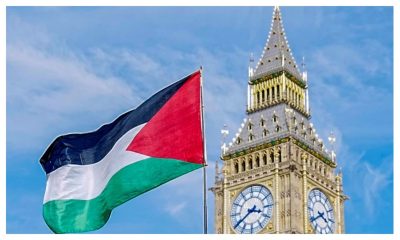NEWS
UK, Canada, Australia Formally Recognize State of Palestine

In a coordinated and historic diplomatic move, three major Western nations—the United Kingdom, Canada, and Australia—have officially recognized Palestine as an independent state. The announcements, which came in quick succession on Sunday, mark a significant departure from decades of foreign policy and are aimed at reviving the long-stalled peace process between Palestinians and Israelis. The timing of the decision, just ahead of the annual United Nations General Assembly meeting in New York, is seen as a strategic effort to put renewed international pressure on all parties to commit to a two-state solution.
The first to make the landmark announcement was British Prime Minister Keir Starmer, who stated that the UK’s decision was intended to “help restore the peace process and advance the two-state solution.” His statement highlighted a growing frustration with the lack of progress on the ground, particularly in the wake of the protracted conflict in Gaza and the continued expansion of Israeli settlements in the West Bank. Shortly after, Canadian Prime Minister Mark Carney confirmed a similar decision on his official X handle, extending Canada’s support to efforts for “lasting peace.” The momentum continued as Australia followed suit, officially recognizing Palestine and aligning itself with the other two nations. This joint move by three of the United States’ closest allies places them at odds with the Trump administration, which has consistently opposed the unilateral recognition of Palestine outside of a final peace deal with Israel.
The recognition is a major symbolic victory for the Palestinian people and their decades-long push for statehood. It also holds particular historical significance for the United Kingdom. More than a century ago, the UK was responsible for the 1917 Balfour Declaration, which supported the establishment of a “national home for the Jewish people” in Palestine. For many, this latest move is an attempt to right a colonial-era wrong and affirm the long-denied right of the Palestinian people to self-determination. With this decision, the number of UN member states that have recognized Palestine now stands at over 150, or over 78% of the total, a powerful indication of shifting global sentiment.
As expected, the move has drawn sharp and opposing reactions from the key players in the conflict. Palestinian President Mahmoud Abbas and other Palestinian officials have welcomed the announcements, describing them as a crucial and necessary step toward a just peace in accordance with international law. They see the recognition as a strong message to Israel about the international community’s growing opposition to the occupation. Conversely, Israel’s government has reacted with strong condemnation. A spokesperson for Israeli Prime Minister Benjamin Netanyahu’s office called the decision an “absurd reward for terrorism,” echoing a view held by others, including some families of Israeli hostages still held in Gaza, who have expressed their concern that such a move will only embolden militant groups like Hamas and complicate efforts to secure the release of their loved ones. Some political figures within the UK, Canada, and Australia have also voiced opposition, arguing that the recognition should have been conditional on a negotiated settlement.
The diplomatic focus now shifts to the United Nations General Assembly, which is set to begin on Monday. The coordinated timing of these announcements is no coincidence. It is intended to build on recent diplomatic efforts, including a UN General Assembly resolution that overwhelmingly endorsed a framework for a two-state solution. While the recognition may not lead to immediate change on the ground, it sends a clear message that the international community believes that a viable Palestinian state is the only path to a lasting peace for both Israelis and Palestinians. The global pressure is mounting, and the future of the Middle East, a region long defined by conflict, may hinge on whether these diplomatic steps can translate into a tangible pathway to peace and security for all its peoples.








